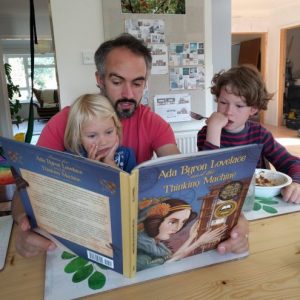Nurturing Noticing

I notice which cereal my daughter ate for breakfast, by her sweet breath in my face an hour later. I notice if my husband drank a coffee between his teas at work when he kisses me good night. I notice who walked through my house, as I sniff entering the front door.
I notice objects moved centimetres, blankets refolded, cushions depressed. I notice new fingerprints on windows, splashes behind sinks, and whether the heating has been on that day.
My sensitivities to noise, smell, taste, and touch class me as a Highly Sensitive Person (HSP). I like familiarity– of routines, people, meals, toiletries even, for that reason. I’m not hugely uncomfortable with different, not as strongly adverse as many HSPs, but I notice discrepancies, differences, deviations from expectations, and I find them tiring to process.
My patient husband knows getting a plate of food for me comes with exact stipulations: My toast well-buttered and diagonally cut, my nachos extra cheesy and uniformly covered, my tea a four-minute brew and in particular mugs depending on the time of day.
However, it is the processing burden this noticing carries that seems to have caused me to keep the volume turned low on my own thoughts. It takes quiet, rest, and conscious effort to extract and export my thoughts or feelings into words, spoken or written (in fact, writing comes more easily). I go through the busy days with a sense of the flavour of my feelings, my conclusions felt as colours, takeaway actions, rather than a stream of consciousness.
And on those busy days, I also struggle to empathise or deeply connect with the feelings of others. My bandwidth for processing used up by all the noticing. For a long time, I wondered if I might be on the autism spectrum. I worried that my inability to put others first or think of their point of view rather than my own was part of a different brain wiring. Many of my friends have met business-like, problem-fixing Hannah, something stereotypically associated with men’s relationships.
But then I noticed all those times I did connect with a friend, child or even a TV character so deeply that I struggled to find the edges of where they ended and I began. I could cry for days over someone else’s problem. Consumed by their situation, as if it were my own. Turns out I notice it all, I just couldn’t notice I’d noticed!
The thinking through others’ feelings or their worse-case scenarios keeps me up at night – if I let it in. And that’s the problem, I’m highly sensitive to mood and emotion too, even my own. It seems that I learnt to cope, to get through the days, by keeping that part of life turned way down. It’s often kept so quiet that I don’t feel it or even feel it’s a part of me. So I can drift through the day, handling the sudden noises and constant chatter of my children, displacement of objects, message notification (yes, my phone is always kept on silent!), meals that didn’t turn out quite as I expected. I rarely watch or follow the news, and I need to consciously work through my friends and family list to ensure I check-in and keep up my important relationships.
Because if I’m going to open the floodgates of feelings, I know I’m going to need to be well-prepared, with lots of time to allow the depth and strength to get properly processed. I can lose myself for weeks on end if strong feelings take hold, unable to handle all the other sensory inputs of life, I’m paralysed when that part of me is online.
Over the last year, I have found that increasing journaling and nurturing my writing has helped to safely open those gates and put words to my feelings without overwhelming my system. There are some weeks when I struggle to put pen to paper, as my brain protects itself a little too well, but mostly now I can feel I’ve given myself a tool to expand my life quality.
The ironic contrast of being highly sensitive to sensory inputs and yet mute to my own thoughts and feelings was an uncomfortable existence. I’m incredibly grateful that through writing I can learn more about myself, which in turn I can bravely share with others, which opens me to hearing their experiences on slightly firmer footing.
I still take a deep breath before listening to myself or others, before typing or writing, before opening my heart a little. But I’m learning I can keep breathing through these high tides of noticing. Until I can rest, at low tide, in quiet stillness again.
This piece was written thanks to a monthly theme on NOTICE from Illuminate, a writing community from The Kindred Voice.
Read more pieces on work from other Illuminate members:
Do You Notice Me? (a haiku) by Mia Sutton
Notice Me by Adeola Sheehy
Noticing by Megan Vos
For the Joy of It by Katherine Mansfield
Notice Me by Amy
A Rose Grows in Brewster by Christine Carpenter
The Unpunctual Liberation from Anxiety by Leesha Mony
Notice by Crystal James


